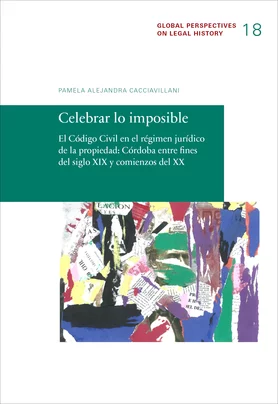ABOUT THE BOOK
The book examines the challenges encountered by a national codification enterprise in the process of its implementation in the province of Córdoba, Argentina at the end of the 19th century. The study’s hypothesis is that the enactment of the Civil Code and its subsequent entry into force were necessary but not sufficient conditions to bring about significant changes in the traditional legal property regime.
The book analyses the operability of the code and the consequences that the enactment of this body of norms generated in society. It especially examines the impact that the Civil Code had on the processes of legal transition from a communal form of ownership – namely by indigenous communities – to private ownership.
As normative points of reference may serve, on the one hand, the entry into force of the Civil Code (1871) and, on the other, the passing of provincial laws aimed at dismantling the property of the existing indigenous communities in Córdoba (1881/1885). As Argentina’s institutional design combines a federal organization with a substantial national codification, the focus on local spaces shows how different policies implemented in areas of provincial competence came into tension with the Civil Code.
The analysis abandons a legalistic view of law by drawing on a wide range of sources to analyze both national and provincial developments. This dual perspective allows for a better understanding of the interpretation and implementation of the Argentine Civil Code in the provinces, but also stimulates a more general reflection on codification in federal contexts. The result is a multifaceted account that highlights the role of a particular provincial institution, the Topographic Department, and of a type of legal technical knowledge, land surveying, in rendering abstract property titles concrete.
In sum, Celebrating the Impossible analyzes the construction of a legal category (property), in a specific time and space, recovering the voices of those who suffered – and suffer – the consequences of law that does not see beyond the legal norm. On the basis of these reflections, the book offers a tool for analyzing the construction of legal categories and cases of conflict in structurally unequal spaces.
IX Agradecimientos
1 Introducción
13 Código y Derecho de propiedad
51 La codificación nacional y sus condicionamientos provinciales en materia de derechos reales entre finales del siglo XIX y comienzos del XX
93 Propiedad y registro: un especial condicionamiento local a la codificación argentina
125 Territorio provincial y propiedad privada en Córdoba a fines del siglo XIX
161 Apropiación del espacio, construcción y redefinición del derecho de propiedad
199 La implementación del marco normativo de las leyes 1881 y 1885 en las comunidades indígenas de Córdoba
253 Conclusión
259 Fuentes y bibliografía
283 About the Author


No comments:
Post a Comment
Note: Only a member of this blog may post a comment.